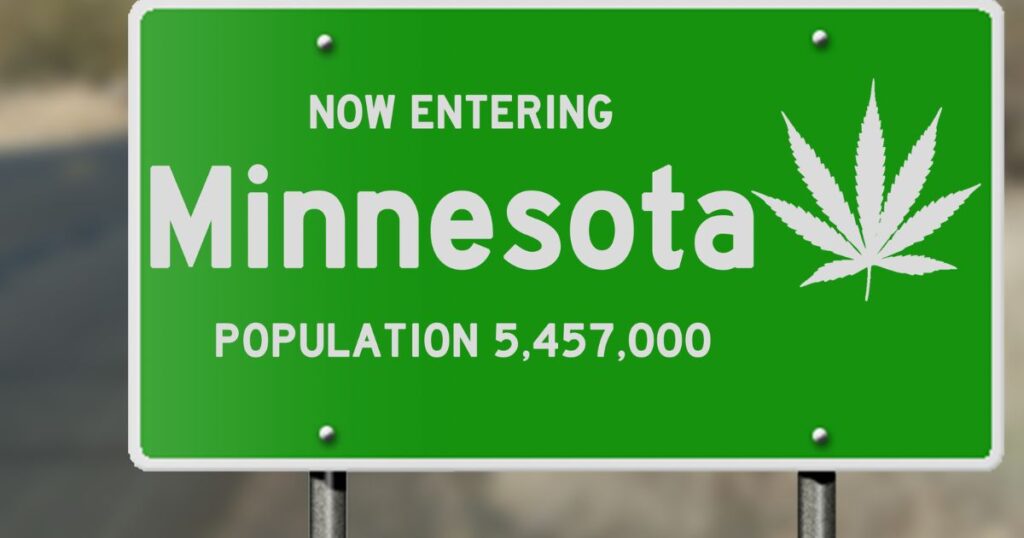Minnesota is on the verge of legalizing cannabis after both chambers of the state legislature passed bills this spring.
The proposals, Senate File 73 (SF 73) from the Senate and House File 100 (HF 100) from the House, are similar in many respects: they would allow adults 21+ to buy marijuana products at licensed retailers, grow their own plants and keep a certain amount for personal use; expunge certain low-level marijuana offenses from criminal records; and grant preference to social equity applicants in awarding licenses to cannabis businesses.
Under SF 73 and HF 100, people 21 years or older would be allowed to purchase marijuana products from licensed retailers. They would be able to cultivate their own plants, with both bills allowing up to eight plants per household. Both bills also allow individuals to possess a certain amount of cannabis for personal use.

In addition, both proposals would expunge certain low-level marijuana offenses from criminal records and give preference to social equity applicants in awarding licenses to cannabis businesses. Furthermore, neither bill allows blanket bans on cannabis businesses within a locality’s borders.
However, there are also some key differences between SF 73 and HF 100 that need to be addressed before either bill can become law.
Possession limits
The differences between the bills in terms of possession amounts are significant. The Senate bill allows for much greater possession limits than the House, allowing residents to accumulate up to 7 pounds compared to the 1.5-pound limit proposed by the House.
Supporters of the Senate bill argue that its generous limits are necessary if Minnesota is going to compete with black market sales and give consumers a reasonable amount of access to legal marijuana products. On the other hand, proponents of the House version point out that these more liberal provisions could have unintended consequences and lead to increased substance abuse problems or illegal transportation across state lines.
Taxes
The difference in the taxes proposed by each chamber lies mainly in how adjustable the rate is. The Senate’s proposal for a flat 10% gross receipt tax would offer consistency to consumers and businesses. In contrast, the House version would let policymakers adjust the rate every other year starting in 2027.
This has been an area of contention between the two chambers, with lawmakers arguing for different approaches. Supporters of the House bill claim that it creates more flexibility to respond to changing market conditions or potential negative externalities of legalizing marijuana use. On the other hand, those backing the Senate bill say that predictability is essential for businesses looking to enter this new sector of Minnesota’s economy.
Penalties
Under the House Bill, someone with two to eight ounces of marijuana without a license faces a $10,000. In contrast, the Senate proposes a much lower penalty of $1,000 for such an offense. The criminal penalties for illegal sales are structured identically in both bills; however, these civil penalties could be the major factor that dictates how seriously authorities take illegal sales.
The high penalty proposed by the House could potentially deter those looking to operate outside of legal channels when it comes to cannabis sales. But, on the other hand, the Senate’s comparatively lenient fine may not offer sufficient discouragement to potential offenders.
Social Equity
The bills both include provisions to give preference to social equity applicants in awarding licenses for cannabis businesses. However, the House version broadens this social equity definition to encompass those convicted of a cannabis offense or who had a close family member convicted of such an offense. Additionally, veterans who have lost honorary status due to a prior cannabis offense are eligible for preferential treatment under either bill. This is intended to ensure that those who have disproportionately borne the brunt of enforcement efforts will be allowed to benefit from legalization.
Local control
Regarding local control, there are a few key differences between the House and Senate versions of the bill. The House version does not explicitly allow cities to enforce zoning requirements on marijuana businesses or limit the number of retailers in a city. However, the Senate version includes these provisions and revenue-sharing provisions that give localities more leeway to regulate the marijuana trade. Furthermore, neither version of the bill allows for blanket bans on cannabis businesses within local borders – a provision that has been seen in places like California and has allowed for black market proliferation.
With the passage of bills in both chambers, Minnesota is poised to become the 23rd state allowing legal cannabis sales – but before that can happen, negotiators from the House and Senate must come together to bridge the differences between their respective versions of the legislation.

House and Senate representatives must craft a unified vision for adult-use cannabis in Minnesota, considering social equity considerations and local control regulations. This will ensure that Minnesotans 21 and older have access to legal marijuana products with minimal disruption to their communities while providing economic opportunities and expunging certain low-level marijuana offenses from criminal records.
The aim should be for all parties involved to commit towards a common goal: creating an equitable, safe, and responsible framework for adult-use cannabis in Minnesota.
Enjoyed that first hit? Come chill with us every week at the Friday Sesh for a freshly packed bowl of the week’s best cannabis news!

















